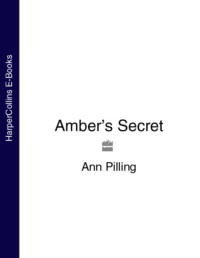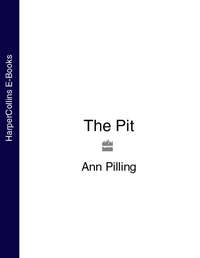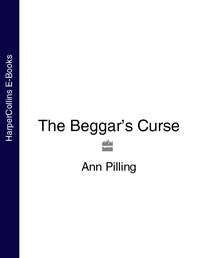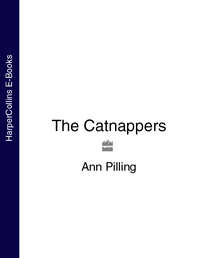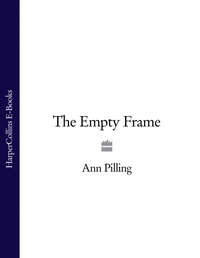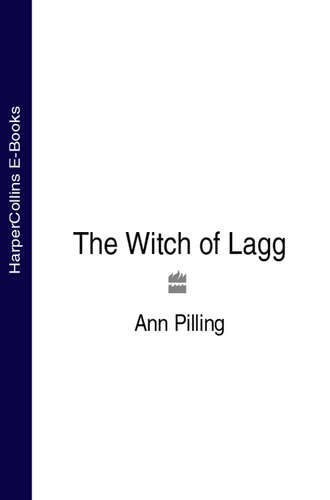
Полная версия
The Witch of Lagg
The old woman knew all about their stone-moving, up at Lochashiel, and she obviously didn’t approve. “Ye’ll stir things up, laddie,” she said, wagging one filthy finger at Oliver who’d crept up close, for a better view. “Young Aggie Ross’ll be oot after ye, that she will …”
Oliver started when he heard that, and a sudden wave of cold swept over him. “Who’s Aggie Ross?” he said, in a hoarse whisper.
The cottage was smelly, and Prill had backed away to stand near the open door. She was looking out into the garden, longing to get away, but Colin was standing near Oliver, and saw everything. When his cousin nearly jumped out of his skin at the name of Aggie Ross their eyes met, just for a moment, and in that moment they both saw the same thing, the barrow going over, and the huge heap of stones, and they heard the spiteful laughter echoing through the woods.
“Aggie Ross,” Oliver repeated, touching the old woman’s skirt. “Who is she?”
If Granny MacCann had heard she pretended not to. She crooned over Alison and stroked the mangy old cat and pressed her shrivelled lips together very firmly. But Oliver, staring very hard at her, in that maddening way of his, saw fear in the ancient face, and perhaps a regret that she’d ever mentioned Aggie Ross.
It felt different in the cottage now, the fire had guttered to a single flame and the old Scots lullaby had stopped abruptly. Outside the sun had gone behind a cloud and the low room was suddenly dark and wintry. “She’ll be oot after ye …” What could it mean?
As usual Oliver’s busy brain was racing ahead but he must go one step at a time. Aggie Ross could well be some distant relative of Angus and Duncan; on the other hand she may be just a local busybody, someone who occasionally rented Lochashiel and didn’t want a troop of kids messing up her garden. They’d have to ask Duncan next time they saw him. After Granny MacCann the Rosses knew more about Lagg Castle and its estate than anyone else around, even though they’d lived in England for a year or so. They’d come back after old Mrs Grierson had died. She’d promised Lochashiel to them, on her death bed, but there was no will. So everything had gone to her son Hugo. Angus Ross hated him for that.
As for moving that heap of stones, Duncan had made nothing of it. So if there was a sinister story attached to the cairn he obviously didn’t know a thing about it. His father might know though.
Prill was signalling wildly for the boys to grab Alison and say goodbye, but Oliver wouldn’t budge. He was fascinated by the cottage. The smell and the filth didn’t bother him at all, he was used to very old people. They hoarded all kinds of rubbish in their bedsitters at home, and old rags and bones were bound to smell a bit if you couldn’t get in to clean properly. There were bones too, all along the window ledges and on the mantelpiece, the skulls of badgers and sheep and mice, the rib cages of birds and what looked like the backbone of a deer. For the old woman to have bones littered round the place struck him as distinctly peculiar until he remembered that Granny MacCann had got seven children and fifteen grandchildren. At various ages they must have often wandered in to this cottage with their treasures from the woods. These were the remains.
Over the fireplace some tiny bones were fanned round in the shape of a star and underneath there were strings and strings of withered red berries. The old woman wore a similar string round her neck. “Tis to keep the de’il awa frae the hoos, laddie,” she croaked, as he fingered the dusty necklaces that hung from the mantelpiece. “Plant rowans and the de’il’ll no’ come near ye.”
Prill and Colin went outside, muttering their goodbyes, followed by a grizzling Alison who would have obviously stayed with the old woman all day. Prill couldn’t understand it. Granny MacCann’s was a face she would dream about in nightmares.
As they waited for Oliver, a fat, untidy-looking woman with a baby in her arms pushed past them, into the house. “And how are ye today, Grann?” she said, in a loud harsh voice. She paid no attention whatever to the three children. Perhaps, in these parts, you were always avoided if you were known to be guests of Hugo Grierson.
They were trailing back along the track towards the road when an awful noise behind made them all whip round. It sounded as if a mad dog had been let loose in a home for stray cats. There was a screaming and a spitting, and a series of ear-splitting howls, and they saw Dandy in the cottage garden, his fur all prickly like a black and white porcupine, tearing up and down the patch of grass, then round in mad circles, faster and faster, chasing his own tail, then racing up a tall birch by the gate, absolutely vertical, like something shot from a gun. They couldn’t see the cat now but they could hear it only too well. It was howling and screeching wildly, shaking all the branches as if every devil in hell was after it.
“What on earth—” began Colin. Alison was frightened and grabbed Prill’s hand, and Jessie was tugging on the lead, nose to the ground, trying desperately to get away towards the road.
“It’s having a fit,” Oliver explained coolly. “I saw the same thing happen once, to one of our resident’s cats. I know it looks frightening but that’s honestly all it is. Animals do have them. The poor thing may have a tumour on its brain or something. I expect that’s how it lost its ear.”
“How?” said Prill, horrified.
“It must have scratched and scratched and reduced it to shreds with its claws. That’d be my guess anyway.”
“It looks bewitched,” said Colin, laughing uneasily. “Just the kind of thing an old crone like that would have. Heavens, I’m not going back there in a hurry.”
Oliver walked ahead of his cousins, on his own. He wanted to think. His carefully reasoned explanation of the cat’s crazy behaviour was only half the truth. The wretched animal may well have something wrong with its brain, but the question was, why? Did these fits happen all the time or had something made it happen? And had Colin’s fall in the woods been just an accident, or was it something more?
Aggie Ross. She was the key. It was all very well for Colin to joke about the old crone and her cat but there’d been an awful silence when that name was mentioned. Silence you could have cut with a knife.
CHAPTER THREE
When they reached the bottom road they thought they’d better get a move on. They’d got an appointment with Hugo Grierson who was going to show them round the house. He’d told them to come at two-thirty but nobody had a watch on. It felt later than that.
They hurried past the crumbling gateposts, with their disapproving stone owls perched on top, and plunged into the gloom of the drive. It was bordered with great pine trees. The pinnacles and chimneys of the enormous house were just visible above them, and above those a dark cloud lowered. Oliver had already christened the place Castle Dracula.
“I wouldn’t like to come along here after dark,” said Colin. “No wonder the servants are always leaving. It’d give anyone the creeps. I wonder what Mr Grierson looks like? Do you think he’s got fangs?”
The two boys giggled but Prill didn’t join in. She wasn’t at all keen on being shown round. She wanted to skip this visit and get down to the sea, to stand on a great lonely beach with nothing between her and the endless waves, taking big breaths of deep, fresh air. Lagg’s woodland frightened her. There was a heaviness in the atmosphere that weighed down on her like some invisible burden, as if she’d been carrying Alison on her back for a very long time.
At the curve of the drive Aunt Phyllis met them. She was agitated and attacked them all with soap and a flannel. “This won’t do at all,” she snapped. “It’s well past half two and Mr Grierson’s been out on the steps looking for you. Now come on! He doesn’t like to be kept waiting.”
Colin really objected to the flannel treatment, but his aunt had already disappeared, dragging Oliver after her and leaving the Blakeman tribe to follow. Prill slipped away and shut Jessie up in the stone kennel outside the kitchen – Grierson wouldn’t allow her to come in the house – then pelted back after the others. She found them all in the great front hall of Lagg, waiting to start the tour. Her father looked rather uneasy. Hugo Grierson seemed to have the same effect on everyone. Mr Blakeman had already told them he was a very suspicious character who didn’t trust anybody and thought the whole world was out to do him down. Duncan Ross had implied that he was nothing more than a pompous old twit, and that it wasn’t a castle at all. Until about ten years ago it had simply been called “Lagg”, or “the big house” by the people round about. Grierson lived in it all alone “wi’ naither kith nor kin”, according to Granny MacCann, building up his riches, seeing no one but business people. Prill, staring up at his face from the front doorstep, thought he was the unhappiest-looking man she’d ever seen.
“An ugsome auld de’il.” That’s how Duncan Ross had described him. Colin found the face neither ugly nor old. Grierson was tall and rather distinguished in appearance, with silky reddish hair flecked with grey. He surely couldn’t be much more than sixty, though he’d got a married daughter and a four-year-old grandson. Where was his wife?
“Well, you’ve seen the basement already, of course,” he began, flashing a strained half-smile at the nervous little group. They certainly had. Dad had been given a comfortable bedroom and bathroom on the second floor, with a dressing room off it, but everyone else was below stairs. It was chilly and damp down there and the rooms were small and meanly furnished. What a place to put guests; they were more like dungeons. Perhaps Lagg Castle wasn’t such a silly name after all.
Grierson explained that he couldn’t spare them very much time. A business associate was due in an hour, and he had some figures to go through, so they were hurried through the hall with no time to inspect its treasures properly; the priceless-looking rugs, roped off as in some kind of stately home, the great oriental vases by the huge fireplace, the stags’ heads on the walls and the feet of elephant and bison set in silver and marked with engraved brass plaques.
Colin hung back to look at a painting as the others followed Grierson up the stairs. It was labelled “Grierson of Lagg in his old age, 1732”. The face was horribly fat and the mass of greyish hair must once have been jet black. The man’s skin was so dark it looked like beaten leather, but the long straight nose and the mean piggy eyes that emerged from the blubber might have belonged to Hugo Grierson himself, and he had the same thin, unforgiving mouth. Take six stone of fat away and dye his hair and this would be Grierson to the life.
No comment was made on the portrait. They climbed higher and higher, up more flights of stairs, with Grierson giving a bored running commentary on the history of the house, something he’d obviously done many times before. As they climbed, various doors were opened briefly. “The blue room … the purple room … the chintz room …” the man parrotted flatly, then, “Helen’s room”.
Alison saw something, tugged her hand free of her father’s, and darted in. They found her clambering up on to an exquisite antique rocking horse and looking round in greedy wonder at the shelves of toys and books. She didn’t want to see any more of this funny old house. Helen’s room was paradise.
Grierson was looking most disapproving. Mr Blakeman quickly extracted Alison and shut the door firmly. There were loud wails all the way up to the tower suite on the fifth floor, a set of rooms where Grierson lived and where Dad was doing the portrait. She was clearly annoying Grierson. He didn’t like spoiled little toddlers and that unbearable noise they all made, but she only stopped crying when they went into his private drawing room. She saw things there that made her forget the rocking horse for a while, and so did the others.
The main room was enormous. You could have made four separate ones out of it, none of them small. Doors led off it into various offices. Even in his own house Grierson talked like an estate agent. The room at the front of the house was a library, at the other end was a master bedroom, a bathroom and a dressing room. Everything was on a very grand scale.
“You could fit our whole house into this,” Prill whispered to Colin. “Isn’t it gloomy though?”
Off the dressing room was a second vast bedroom which had been cleared out to make a studio. Grierson disappeared into it with Dad. Now the tour was over he seemed to have forgotten all about the children and they wandered about looking at things on their own.
“For heaven’s sake don’t touch anything,” Prill’s father muttered to her as Grierson swept him off to discuss progress so far. He was obsessively interested in his portrait.
Prill went straight over to the library window with Alison in her arms. You could see the sea from there, and that was where she wanted to be, not here in this unlovely, silent house stuffed with all its dusty relics. The tide was out and the sand gleamed, peach-coloured and glistening in the afternoon sun. It was a wide, wide beach with dark woods sloping down to it, and a strip of whitish stones where the sand began. Some way out from the trees she saw a great blackened stake. It was hard to tell how tall it was, from this distance, but it looked like the trunk of a very large, straight tree, and it was driven right into the sand like a gigantic nail.
Grierson, coming through from the studio for a minute to check that nothing was being tampered with, saw her staring down. A strange, blank look came into his eyes, then his mouth twisted into a little smile. “No doubt you’re wondering what that is? It’s an old family memorial. Not ours, mind you. Now there are Rosses round here again they waste my time keeping it standing. They go down there sometimes, scraping the barnacles off. Hub!” He gave a loud, unpleasant laugh. “Best oak that was, from my woodland. Rosses … huh.” He spat the name out as if it was poisonous.
He went back into the studio and shut the door, leaving Prill by the open window, clutching Alison, and shaking. Grierson’s presence had had the most extraordinary effect on her. She’d felt almost suffocated by him, and by the sheer weight of malice and loathing in his voice. He really did seem to hate the poor Rosses, and that stake on the beach obviously had some strange significance for him. What could be wrong with the man to speak so savagely to a young girl he hardly knew?
Alison had burst into tears when she saw that thin mean face close up. She’s struggled in Prill’s arms and waved her little pink paws at the open window, pointing down urgently.
“Yes, beach,” Prill murmured soothingly. “Sand. Allie go to beach soon. Don’t cry, pet.” It was better now Grierson had gone back to his precious portrait. Alison hadn’t just disliked him, she’d been scared. Her small firm body had gone all rigid and stiff in Prill’s arms, and that only ever happened when something really frightened her.
On the other side of the room Colin had made an interesting discovery. Tucked behind a cabinet, as if Grierson wanted nobody to see it, a sampler, worked in coloured wool, hung on a nail. It was the most curious text he’d ever seen on a thing like that. His grandmother had several, and they all went on about virtue and piety. But in large red letters this one stated boldy, “Thou shalt not suffer a witch to live: Exodus 22 v. 18”, and the date was embroidered underneath in blue cross-stitch. “May 20th 1865”.
Oliver was the person to ask about this. His general knowledge was amazing and his mother, who was very religious, had just had him confirmed. She now took him to church twice every Sunday and made him sit through extremely long services. He’d have something to say about this sampler. But when he saw what his cousin was doing Colin didn’t dare call him over in case Mr Grierson suddenly came out of the studio again. The little nosy parker was bent over a large writing desk, where he actually seemed to be looking at Grierson’s private papers.
What Oliver had under his nose was a diary written up for the day before, and he was busily inspecting it. Well, it couldn’t be very private if the man left it open for all to see, so why not? There was nothing exciting in it anyway, just a very boring account of a very boring day, about six lines, with some additions and subtractions pencilled in the margin. What caught his eye, though, was the bit at the end in red. It was written backwards, in mirror writing, but Oliver had no problem with it. He was left-handed and he often wrote like that, when he was bored in lessons. “Oh God,” he read, “wherefore art Thou absent from us so long? Why is Thy wrath so hot against the sheep of Thy pasture?”
What on earth was that doing there? It was from one of the Psalms, one of the really miserable ones that went on and on moaning while your neck got stiff and your bottom sore, listening to the choir. Daringly, he turned back a few pages. Each entry was the same, a factual account of his day then these awful back to front bits in red. “Haste Thee, O God, to deliver me; make haste to help me, O Lord.” And, “Save me, O God, for the waters are come in, even unto my soul.”
At the sound of Grierson’s voice droning on and on about canvases and poses and what he ought to wear for his portrait, Oliver retreated hastily and whipped round. Colin stepped back from the queer sampler and pretended to be inspecting a clock, and Prill came forward into the middle of the room with Alison held in front of her, like a shield. In Grierson’s presence they all lined up automatically, like an army waiting for instructions.
He came over to the window, pushed past Prill, stood looking out for a minute, then slammed it shut quite violently. It was as if he’d seen or heard something down there that displeased him. He even drew a curtain half-way across and darkened the room. All sense of peace had vanished with his coming, and as soon as she saw him, Alison began to cry bitterly. He clearly wanted them out of the way. An accountant called Robert Guthrie was due, and Dad had been asked to stay for a drink so they could meet each other, and have a look at the portrait together.
The children were offered nothing, and Mr Grierson was steering them testily towards some cold back stairs.
“You’ll get down quicker that way,” he said stiffly, almost pushing them through the door. Alison was now crying quite hysterically. She was cold out here and she wanted to stay with her father.
“Never mind, pet,” Prill said, stroking her cheek. “He’s a horrid man, he doesn’t understand about families. Don’t cry. We can take you down to the beach.”
“No wonder his daughter married and left home,” Colin whispered to Oliver as they clattered down the icy stone staircase. “No wonder she never comes to see him. Can’t blame her. Can you?”
CHAPTER FOUR
“You can go,” said Aunt Phyllis, “as long as you’re back by six. No, no, leave Alison with me. Don’t want any disasters. Now about the swimming—”
“Mother, we aren’t going swimming,” Oliver said impatiently. “I’ve told you, we just want to have a look at the beach, that’s all.”
“We saw it from Mr Grierson’s room,” added Prill. “It looks beautiful.”
“All right then.” Aunt Phyllis sounded distinctly put out. She’d decided to make them all tidy up their rooms before the evening meal. The Blakemans didn’t put anything away, and there were books all over Oliver’s bed. Still, it was a fine afternoon, and there may not be too many of those. Let them go to their beach. It’d be quieter anyway, with just the toddler to cope with.
Prill half ran there, partly because she was trying to keep up with Jessie, partly because she wanted to escape from Lagg’s woodlands and get by the sea. At least Grierson didn’t own that. When the two boys caught up with her she was standing quite still on the edge of the plantation. The trees were small here and many were half buried in fine sand. It was such an exposed stretch of coast Prill wondered how anything could survive for very long. Except on the calmest day the winds rushed across wildly and the currents were highly dangerous, according to Duncan, the tide creeping up quite without warning. There were ugly “No Swimming” notices all along the dunes, at lurching angles, like old gravestones.
Colin and Oliver came up behind and stared with her. Directly in front of them, stretching for miles on each side, were the most marvellous dunes. The sand was silver-white, so clean you could almost smell it, and moulded into great mounds and hollows by the endless wind that had made holes and dips and craters in it, like the surface of the moon.
Colin wished he was six again. He wanted to kick his shoes off and roll in those hollows, he wanted to tear away and hide, he wanted to run to the very tops and pelt down the sandy slopes and plop into the bottom like a baby. But Oliver’s eyes saw none of this. They were riveted on the stake.
“Let’s walk out to it,” he said in an odd, faraway voice. “Let’s get there before the tide comes in. I want to see it properly.”
“Oh, it’ll be hours before we need to worry about that,” said Colin, clambering down through the dunes and on to the flat of the beach. “It’s not turned yet, surely.”
“It has, you know, and it comes up quite suddenly just here. Your friend Duncan said so.” Oliver’s voice was sarcastic. He was a bit sick of hearing all about what Duncan Ross said and did. Colin so obviously preferred the Scots boy to him. “Come on Prill,” he called. She was still up on the dunes, throwing sticks to Jessie. “We don’t want to go back without seeing it.”
Prill came, reluctantly. It was a beautiful beach but the stake spoiled it. Unless you hid in one of the moon craters there was nowhere you could go without your eye catching it. Its knobbled blackness reared up, staining the pure sand, and made strange witchy shadows as the afternoon sun sank lower, and the first chill of the evening crept up on them.
“It’s much bigger than it looks,” said Oliver, crouching down, “Thicker as well as taller.” They were right up to the stake now, and wandering all round it. “And it’s pine, not oak,” he added, squinting at it.
“Grierson said it was oak,” Prill muttered, standing away from it. “Best oak from my own woodland,” she repeated. “That’s what he said.”
“Well, the first one must have been oak in that case,” said Oliver, taking a tape measure from his pocket. “But, if the site’s as old as people think, it must have been replaced several times.”
“How long has it been here then?” asked Colin.
“Oh, hundreds of years. I don’t know exactly. I’ve not researched it properly yet,” his cousin said self-importantly, measuring the girth of the trunk. “How tall do you think it is?”
Colin stood next to it. “Well, I’m five foot six, so I reckon … one … two … about eight feet, say eight and a half. But what’s it doing here? That’s what I’d like to know.”
“Dunno. We can ask the Rosses. They look after it,” said Oliver, “according to Drac. It obviously marks some significant event though. Perhaps it was the scene of a fight or something. We’re quite near the English border here after all.” He pocketed his tape measure, folded his arms and stared at it thoughtfully. Prill had her back to the two boys and was leaning against the stake, staring out to sea.
“The tide is coming in,” she said dreamily. “Look, it’s filling all these little channels now. We’ll get our feet wet if we don’t budge.”
Colin suddenly whispered something to Oliver and the boy smiled, and dug in his pocket. A minute later poor Prill found herself grabbed from behind and tied securely to the old wooden stump with a green tape measure. The others were running off up the beach. Jessie was leaping about, pawing and slobbering all over her, and the tide was filling those deep channels faster and faster.


